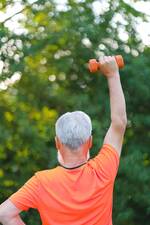
10 May The Benefits of Physical Activity for Seniors
Most people understand that staying active is important when you’re older, but not all understand how much. Exercise can do more than simply make you strong and help you maintain your mobility. Physical activity affects every part of your body since bodies were made to move. If you or someone you know is a senior and is not getting enough physical activity, here are a few reasons why you should do more of it.
Preserve Cognitive Function
Did you know that mental activity could lower the chances of someone suffering from Alzheimer’s and dementia? A review of 11 studies found that regular activity could decrease the probability of someone suffering from dementia in their lifetime by 30%. The rate was even higher for people suffering from Alzheimer’s. The review found that people who participated in regular activity were 45% less likely to suffer from the disease.
There could still be benefits if you or the person you know is already suffering from these health issues. However, it would be a good idea to start looking for senior living facilities that offer either assisted living or memory care. If you’re looking for a good senior living St Louis facility, St Louis Hills assisted living and memory care is a great option. Facilities like this offer a very wide number of services and focus on fostering social activity and a sense of community, which are two more things that can reduce the chance of seniors developing cognitive issues or reducing their symptoms.
Improve the Mood
 In addition to preventing or offsetting the symptoms of Alzheimer’s and various cognitive issues, exercise also has a great effect on mood. Many seniors start suffering from depression as they get older, and exercise is one of the best natural anti-depressants we have. Exercise can reduce the amount of cortisol – the stress hormone – that flows through the body and release endorphins. Endorphins have a mind-lifting effect and also provide whole-body relief. So, if you’re dealing with depression and chronic pain, make an effort to include at least some physical activity into your routine.
In addition to preventing or offsetting the symptoms of Alzheimer’s and various cognitive issues, exercise also has a great effect on mood. Many seniors start suffering from depression as they get older, and exercise is one of the best natural anti-depressants we have. Exercise can reduce the amount of cortisol – the stress hormone – that flows through the body and release endorphins. Endorphins have a mind-lifting effect and also provide whole-body relief. So, if you’re dealing with depression and chronic pain, make an effort to include at least some physical activity into your routine.
Improve Joint Health
A lot of seniors start dealing with joint issues as they get older and physical activity can greatly reduce the occurrence and severity of joint pain. Walking regularly is one of the best ways to keep the joints active and is a low-impact activity that any senior can participate in. Water aerobics is another great option you could try.
Better Immunity
Exercise can have a huge impact on how strong your immune system is. A 2018 study found a correlation between moderate physical activity and fewer sick days at work. We still don’t know the exact reasons why exercise seems to have immune-boosting properties, but some scientists have theorized that it has to do with its anti-inflammatory action.
As you can see, physical activity is extremely important for seniors. So, make sure that you get a good dose of it in your daily routine if you want to reap all of those benefits.
[wysija_form id=”3″]
[last-modified]
The information on MedicalResearch.com is provided for educational purposes only, and is in no way intended to diagnose, cure, or treat any medical or other condition. Always seek the advice of your physician or other qualified health and ask your doctor any questions you may have regarding a medical condition. Some links may be sponsored and no links are warranted or endorsed by MedicalResearch.com or its parent company, Eminent Domains Inc. In addition to all other limitations and disclaimers in this agreement, service provider and its third party providers disclaim any liability or loss in connection with the content provided on this website.
Last Updated on March 6, 2023 by Marie Benz
